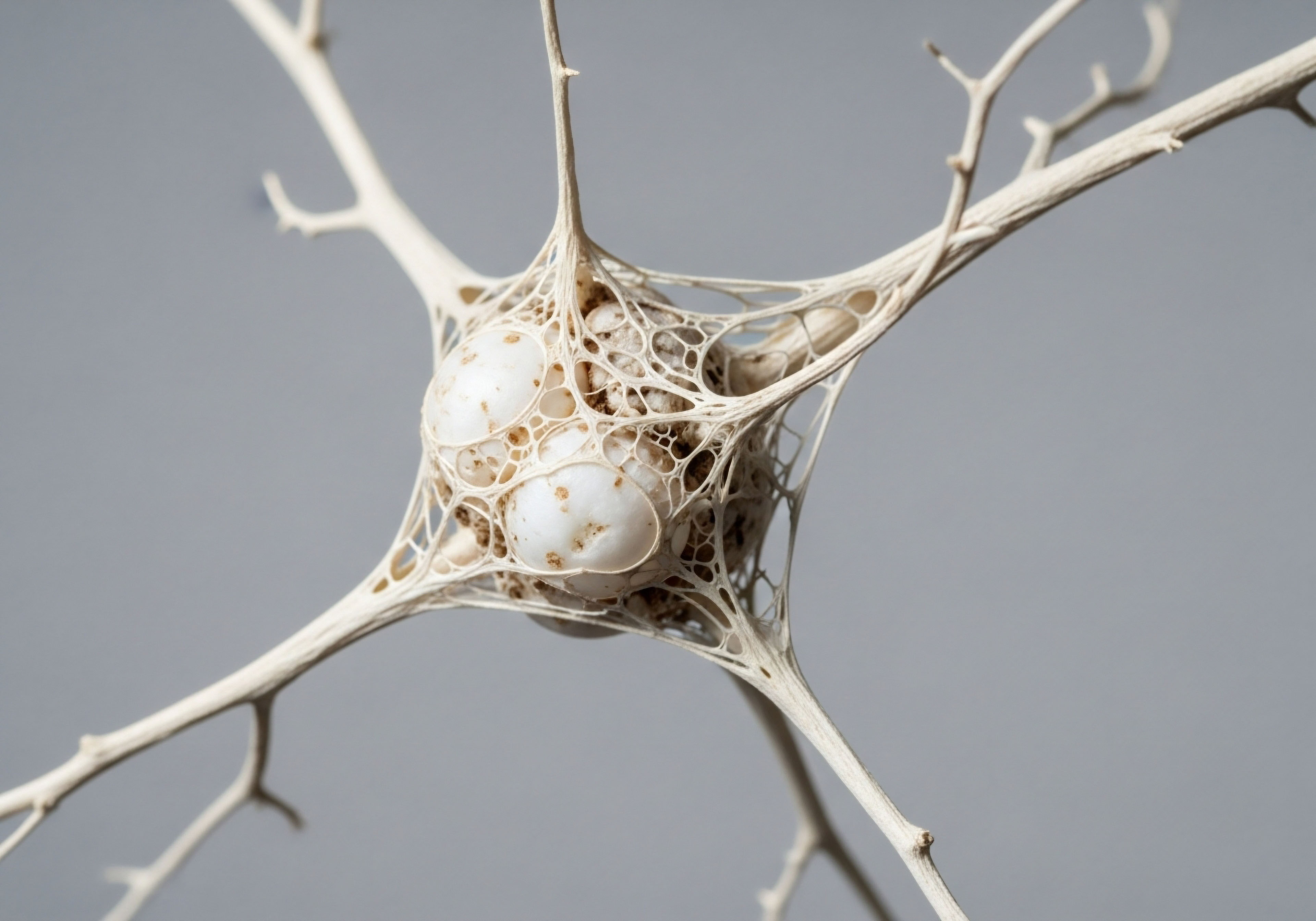

Fundamentals
A feeling of mental fogginess, a struggle with recall, or a general sense of diminished sharpness can be deeply unsettling. Many individuals experience these cognitive shifts, often attributing them to stress, aging, or simply a busy life. Yet, beneath these common explanations, a more intricate biological conversation unfolds within the body.
Your personal experience of a mind that feels less agile is a valid signal, prompting a deeper inquiry into the systems that govern your vitality. This exploration centers on the endocrine system, a complex network of glands and hormones that orchestrate countless bodily functions, including those related to thought processes and mental clarity.
Understanding the subtle yet profound influence of hormones on brain function offers a path toward reclaiming cognitive vibrancy. The journey to mental acuity often begins with recognizing that the brain, while remarkable, does not operate in isolation. It is intimately connected to the body’s chemical messengers, which dictate cellular communication and metabolic efficiency.
When these messengers fall out of their optimal range, the impact can extend to every aspect of well-being, including how clearly one thinks, remembers, and processes information.

The Endocrine System and Brain Function
The endocrine system functions as the body’s internal communication network, dispatching chemical signals known as hormones throughout the bloodstream. These hormones interact with specific receptors on cells, influencing a wide array of physiological processes. The brain, a highly metabolically active organ, possesses numerous receptors for various hormones, making it particularly susceptible to fluctuations in their levels. This intricate relationship means that hormonal balance is not merely about reproductive health or energy levels; it directly influences neural activity and cognitive performance.
Consider the brain’s constant need for energy. Hormones play a significant role in regulating glucose metabolism, the primary fuel source for brain cells. When hormonal signals related to metabolism are disrupted, the brain’s energy supply can become inconsistent, leading to symptoms such as mental fatigue or difficulty concentrating. This metabolic connection highlights a fundamental principle ∞ optimal brain function relies on a well-regulated internal environment, where hormones contribute to stable energy provision and cellular health.
Cognitive shifts often signal deeper biological conversations within the body’s endocrine system.

Hormonal Signals and Cognitive Performance
Specific hormones exert direct effects on brain regions associated with memory, learning, and mood. For instance, sex steroids, such as estrogens, androgens, and progesterone, are not solely involved in reproductive processes. They also act as neurosteroids, influencing neuronal growth, synaptic plasticity, and neurotransmitter systems. A decline or imbalance in these hormones can therefore manifest as changes in cognitive abilities, affecting verbal recall, spatial orientation, or executive functions.
The brain’s ability to adapt and form new connections, known as neuroplasticity, is also influenced by hormonal signaling. Hormones contribute to the health and maintenance of neurons, supporting the intricate pathways that underpin complex thought. When these hormonal influences are suboptimal, the brain’s capacity for adaptation may diminish, contributing to the subjective experience of a less sharp mind. Addressing these underlying hormonal factors represents a proactive approach to supporting long-term cognitive vitality.
The interplay between hormones and brain function extends to neurotransmitters, the chemical messengers that transmit signals between nerve cells. Hormones can modulate the production, release, and receptor sensitivity of neurotransmitters like dopamine, serotonin, and acetylcholine, all of which are essential for mood regulation, attention, and memory. A disruption in hormonal equilibrium can therefore indirectly affect cognitive processes by altering neurotransmitter activity, leading to symptoms such as irritability, reduced focus, or memory lapses.


Intermediate
For individuals experiencing cognitive decline or seeking to optimize mental acuity post-therapy, a targeted approach to hormonal recalibration can offer substantial benefits. This involves understanding specific clinical protocols designed to restore endocrine balance, thereby supporting brain health. The therapeutic agents and strategies employed aim to re-establish physiological levels of hormones, influencing neural pathways and metabolic processes that underpin cognitive function.

Testosterone Recalibration for Men
For men, a decline in testosterone levels, often termed andropause, can contribute to a range of symptoms, including reduced mental sharpness, fatigue, and mood alterations. Testosterone replacement therapy, or TRT, is a protocol designed to address these deficiencies. The standard approach frequently involves weekly intramuscular injections of Testosterone Cypionate, typically at a concentration of 200mg/ml. This method ensures consistent delivery of the hormone, aiming to restore levels within a healthy physiological range.
The impact of testosterone on cognitive function in men is a subject of ongoing study. Research indicates that testosterone receptors are present in various brain regions, including the hippocampus and prefrontal cortex, areas vital for memory and executive functions. Some studies have shown that testosterone administration can improve aspects of spatial and verbal memory in older men with lower testosterone levels. This suggests a direct influence on neural circuits involved in cognitive processing.
A comprehensive TRT protocol extends beyond testosterone administration. To maintain the body’s natural production of testosterone and preserve fertility, Gonadorelin is often included, administered via subcutaneous injections twice weekly. Gonadorelin acts on the pituitary gland, stimulating the release of luteinizing hormone (LH) and follicle-stimulating hormone (FSH), which are essential for testicular function.
Additionally, Anastrozole, an oral tablet taken twice weekly, may be prescribed to manage the conversion of testosterone into estrogen, preventing potential side effects associated with elevated estrogen levels. Some protocols also incorporate Enclomiphene to further support LH and FSH levels, providing a more complete endocrine system support.
Testosterone recalibration in men can improve cognitive functions like spatial and verbal memory.

Hormonal Balance for Women
Women navigating pre-menopausal, peri-menopausal, and post-menopausal phases often experience significant hormonal shifts that can affect cognitive well-being. Symptoms such as irregular cycles, mood changes, hot flashes, and diminished mental clarity are common. Hormonal optimization protocols for women aim to address these imbalances, supporting brain function through precise hormone delivery.
One approach involves subcutaneous injections of Testosterone Cypionate, typically in lower doses (10 ∞ 20 units or 0.1 ∞ 0.2ml) weekly. While testosterone is often associated with male physiology, it plays a significant role in female health, influencing libido, mood, and cognitive acuity. Clinical observations suggest that appropriate testosterone levels contribute to mental energy and focus in women.
Progesterone administration is a critical component of female hormone balance protocols, with its use tailored to menopausal status. Progesterone is known to have neuroprotective properties and can influence brain regions involved in memory and mood. Studies indicate that natural progesterone may be associated with more positive cognitive outcomes, particularly verbal working memory, compared to synthetic progestins.
For some women, Pellet Therapy, which involves long-acting testosterone pellets, offers a convenient delivery method. When appropriate, Anastrozole may also be included to manage estrogen levels, similar to male protocols.

How Do Hormonal Therapies Influence Brain Networks?
Hormonal therapies exert their influence on cognitive function through various mechanisms, impacting brain networks and cellular processes. These mechanisms extend beyond simply replacing deficient hormones; they involve modulating neurotransmitter systems, supporting neuronal health, and influencing cerebral blood flow.
- Neurotransmitter Modulation ∞ Hormones can alter the synthesis, release, and receptor sensitivity of key neurotransmitters such as acetylcholine, dopamine, and serotonin. Acetylcholine is vital for memory and learning, while dopamine influences attention and motivation. Serotonin plays a role in mood and emotional regulation. By optimizing hormonal levels, these neurotransmitter systems can function more effectively, leading to improvements in cognitive performance and emotional stability.
- Neuronal Health and Plasticity ∞ Sex hormones, for example, have direct effects on neuronal structure and function. They can promote the growth of new neurons (neurogenesis) and strengthen existing synaptic connections (synaptic plasticity). This supports the brain’s ability to adapt, learn new information, and maintain cognitive flexibility.
- Cerebral Blood Flow ∞ Hormones can influence the health and function of blood vessels in the brain, ensuring adequate blood supply to neural tissues. Optimal cerebral blood flow is essential for delivering oxygen and nutrients, supporting the high metabolic demands of cognitive processes.

Post-Therapy and Fertility Protocols for Men
For men who have discontinued TRT or are actively trying to conceive, a specialized protocol aims to restore natural hormone production and fertility. This protocol typically includes a combination of agents designed to stimulate the body’s own endocrine system.
- Gonadorelin ∞ Continues to be used to stimulate the pituitary gland, encouraging the testes to produce testosterone and sperm.
- Tamoxifen ∞ A selective estrogen receptor modulator (SERM) that blocks estrogen’s negative feedback on the pituitary, thereby increasing LH and FSH production.
- Clomid (Clomiphene Citrate) ∞ Another SERM that stimulates gonadotropin release, promoting testicular function.
- Anastrozole ∞ May be optionally included to manage estrogen levels if they become elevated during the recovery phase.
These agents work synergistically to reactivate the hypothalamic-pituitary-gonadal (HPG) axis, the central regulatory system for reproductive hormones. By carefully managing this recalibration, individuals can transition from exogenous hormone support while preserving their natural endocrine function and fertility potential.

Growth Hormone Peptide Therapy
Growth hormone peptide therapy represents an advanced approach to supporting overall well-being, including cognitive function, particularly for active adults and athletes seeking anti-aging benefits, muscle gain, fat loss, and improved sleep. These peptides stimulate the body’s natural production of growth hormone (GH), which plays a role in brain health.
Key peptides in this category include:
| Peptide Name | Primary Action | Cognitive Relevance |
|---|---|---|
| Sermorelin | Stimulates GH-releasing hormone (GHRH) release | Supports neurogenesis, memory, and mental clarity. |
| Ipamorelin / CJC-1295 | GH secretagogues, increase GH pulsatility | Promote neuron growth and repair, enhance learning and memory. |
| Tesamorelin | GHRH analog, reduces visceral fat | May improve cognitive function in specific populations, indirectly supports brain health via metabolic improvements. |
| Hexarelin | GH secretagogue, also has direct cardiac effects | Contributes to neuroprotection and overall brain cellular health. |
| MK-677 (Ibutamoren) | Oral GH secretagogue | Supports sleep quality, which is vital for cognitive restoration and memory consolidation. |
Growth hormone and its downstream mediator, Insulin-like Growth Factor-I (IGF-I), are known to influence brain function. GH deficiency has been linked to impaired cognitive function, and GH replacement therapy has shown improvements in memory, motivation, and mental processing speed. These peptides, by safely increasing GH levels, can contribute to enhanced neuroprotection and improved cognitive performance.

Other Targeted Peptides for Specific Needs
Beyond growth hormone secretagogues, other peptides offer targeted support for specific aspects of health that can indirectly influence cognitive well-being.
- PT-141 (Bremelanotide) ∞ Primarily used for sexual health, PT-141 acts on melanocortin receptors in the brain, influencing sexual desire. While its direct cognitive effects are not the primary focus, a healthy sexual life contributes to overall well-being and can indirectly support mental state.
- Pentadeca Arginate (PDA) ∞ This peptide is utilized for tissue repair, healing, and inflammation reduction. Chronic inflammation can negatively impact brain health and cognitive function. By mitigating inflammation, PDA can create a more favorable environment for neural health, indirectly supporting cognitive acuity.
The careful selection and administration of these peptides, guided by clinical assessment, represent a sophisticated approach to optimizing physiological systems that collectively contribute to cognitive vitality.


Academic
The intricate relationship between hormonal systems and cognitive function extends to the deepest levels of endocrinology and systems biology. A comprehensive understanding of how hormonal recalibration influences cognitive processes post-therapy requires an examination of the interplay between various biological axes, metabolic pathways, and neurotransmitter dynamics. This section explores the scientific underpinnings of these connections, drawing upon clinical research and data to provide a detailed perspective.

The Hypothalamic-Pituitary-Gonadal Axis and Cognition
The Hypothalamic-Pituitary-Gonadal (HPG) axis represents a central neuroendocrine system that regulates reproductive function, yet its influence extends significantly to brain health and cognitive performance. This axis involves a complex feedback loop ∞ the hypothalamus releases Gonadotropin-Releasing Hormone (GnRH), which stimulates the pituitary gland to secrete Luteinizing Hormone (LH) and Follicle-Stimulating Hormone (FSH). These gonadotropins then act on the gonads (testes in men, ovaries in women) to produce sex steroids, primarily testosterone, estrogens, and progesterone.
Age-related changes in the HPG axis are well-documented and correlate with cognitive decline. For instance, in men, a reduction in testosterone levels with aging can affect brain regions rich in androgen receptors, such as the hippocampus and prefrontal cortex, which are crucial for memory and executive functions. Studies have shown that testosterone can influence spatial and verbal memory, though results on overall cognitive improvement with testosterone supplementation remain varied across different populations and study designs.
In women, the dramatic decline in estrogen and progesterone during perimenopause and postmenopause significantly impacts cognitive function. Estrogens, particularly estradiol, are known to influence neuronal plasticity, cerebral blood flow, and neurotransmitter systems like the cholinergic system, which is vital for memory.
Progesterone also exhibits neuroprotective properties and can influence cognitive domains, with natural progesterone potentially offering more favorable cognitive outcomes compared to synthetic progestins. The timing of hormonal intervention relative to the onset of menopausal changes appears to be a critical determinant of cognitive benefits.
The HPG axis profoundly influences cognitive function through sex steroid modulation and neural pathway interactions.

Metabolic Health and Brain Energetics
Cognitive function is highly dependent on consistent and efficient brain energetics. The brain, despite its relatively small mass, consumes a disproportionately large amount of the body’s energy. Metabolic hormones play a pivotal role in regulating this energy supply. Dysregulation in metabolic pathways, such as insulin resistance, can directly impair brain function.
Insulin, a key metabolic hormone, is not only involved in glucose regulation in the periphery but also acts as a neurotrophic factor in the brain, influencing neuronal survival, synaptic plasticity, and neurotransmitter release. Cerebral insulin resistance, where brain cells become less responsive to insulin, is increasingly recognized as a contributor to cognitive decline and neurodegenerative conditions.
Other metabolic hormones, including leptin and amylin, also influence brain metabolism and cognitive processes. Leptin, produced by adipose tissue, plays a role in satiety and energy balance, and its signaling pathways in the brain are linked to cognitive performance. Amylin, co-secreted with insulin, helps regulate glucose and has neuroprotective effects.
The gut-brain axis also contributes to metabolic and cognitive health. The gut microbiota produces metabolites that can influence neural and hormonal signaling, affecting brain function. This intricate communication network underscores that metabolic health is not merely about blood sugar levels; it is a systemic state that directly impacts the brain’s ability to function optimally.

Neurotransmitter Systems and Hormonal Interplay
Hormones and neurotransmitters are deeply interconnected, forming a complex regulatory system that governs cognitive processes. Neurotransmitters are chemical messengers that transmit signals across synapses, influencing everything from mood and attention to memory and learning. Hormones can modulate these neurotransmitter systems at multiple levels.
For example, sex steroids influence the synthesis, release, and receptor sensitivity of monoamine neurotransmitters like dopamine, serotonin, and norepinephrine. Dopamine is essential for reward, motivation, and executive functions. Serotonin regulates mood, sleep, and anxiety. Norepinephrine influences attention and arousal. Imbalances in these neurotransmitters, often secondary to hormonal fluctuations, can manifest as cognitive deficits such as reduced focus, impaired decision-making, or memory difficulties.
The cholinergic system, primarily involving acetylcholine, is another critical pathway for cognitive function, particularly memory. Estrogens have been shown to influence cholinergic activity, supporting the health and function of cholinergic neurons. This suggests that hormonal recalibration can directly support the integrity of neurotransmitter systems vital for cognitive acuity.

What Evidence Supports Hormonal Recalibration for Cognitive Gains?
Clinical evidence regarding hormonal recalibration and cognitive function is complex, with varying outcomes depending on the specific hormone, dosage, timing of intervention, and individual patient characteristics.
| Hormone/Therapy | Observed Cognitive Effects | Key Considerations |
|---|---|---|
| Testosterone (Men) | Improvements in spatial and verbal memory in some studies, particularly in older men with low levels. | Results are mixed; optimal dosing and individual response vary. |
| Estrogen (Women) | May improve verbal memory, vigilance, reasoning, and motor speed in symptomatic menopausal women. | Timing of initiation (critical window hypothesis) and specific estrogen formulation are significant. |
| Progesterone (Women) | Associated with improved verbal working memory and positive brain activation patterns. | Natural progesterone generally shows more favorable cognitive outcomes than synthetic progestins. |
| Growth Hormone Peptides | Enhance memory, learning, neuroprotection, and overall mental clarity by promoting neurogenesis and neuronal repair. | Indirect benefits through improved sleep and metabolic health. |
The concept of a “critical window” for hormone therapy in women is particularly relevant. Some research suggests that initiating estrogen therapy closer to the onset of menopause may yield more cognitive benefits, while starting much later in life might not offer the same advantages or could even carry risks. This highlights the importance of individualized assessment and precise timing in clinical protocols.

Can Metabolic Dysregulation Affect Brain Function Independently of Hormones?
While hormones are central to metabolic regulation, metabolic dysregulation can also independently affect brain function. Conditions such as insulin resistance, chronic inflammation, and oxidative stress directly impair neuronal health and synaptic function, even in the presence of seemingly normal hormone levels.
Chronic inflammation, for example, can lead to the activation of microglia, the brain’s immune cells, which can then release pro-inflammatory cytokines that damage neurons and disrupt synaptic communication. Oxidative stress, an imbalance between free radicals and antioxidants, can cause cellular damage throughout the brain, contributing to cognitive decline.
These processes are often intertwined with hormonal imbalances but can also arise from lifestyle factors such as diet, lack of physical activity, and chronic psychological stress. Addressing these broader metabolic and inflammatory factors is therefore an integral part of any comprehensive strategy to support cognitive well-being.
The brain’s energy metabolism is highly sensitive to fluctuations in glucose supply and utilization. When cells become resistant to insulin, they struggle to absorb glucose efficiently, leading to a state of “cerebral glucose hypometabolism.” This energy deficit can impair neuronal function, affecting cognitive processes such as memory formation and information processing speed.
Dietary interventions, such as those that promote metabolic flexibility and ketone body utilization, are being explored as strategies to provide alternative fuel sources for the brain and mitigate the effects of glucose dysregulation.

References
- LeBlanc, Elizabeth S. et al. “Hormone replacement therapy and cognition ∞ systematic review and meta-analysis.” JAMA, vol. 285, no. 11, 2001, pp. 1489-1499.
- Cherrier, Monique M. et al. “Testosterone supplementation improves spatial and verbal memory in healthy older men.” Psychoneuroendocrinology, vol. 26, no. 7, 2001, pp. 605-616.
- Maki, Pauline M. and Theresa E. Henderson. “Hormone therapy and cognitive function.” Human Reproduction Update, vol. 18, no. 3, 2012, pp. 272-289.
- Lethaby, Ann, et al. “Hormone replacement therapy for cognitive function in postmenopausal women.” Cochrane Database of Systematic Reviews, no. 1, 2008, Art. No. ∞ CD003122.
- Resnick, Susan M. and Theresa L. Henderson. “Hormone therapy and cognitive function in postmenopausal women ∞ a review of the Women’s Health Initiative Memory Study.” Neuroscience & Biobehavioral Reviews, vol. 30, no. 7, 2006, pp. 1009-1018.
- Blair, Jeffrey A. et al. “Hypothalamic-pituitary-gonadal axis involvement in learning and memory and Alzheimer’s disease ∞ More than ‘just’ estrogen.” Frontiers in Aging Neuroscience, vol. 7, 2015, p. 48.
- Deijen, Jan B. et al. “Cognitive function and psychological well-being in growth hormone-deficient adults ∞ a 2-year follow-up study.” Psychoneuroendocrinology, vol. 23, no. 8, 1998, pp. 877-886.
- Popovic, V. et al. “Growth hormone (GH) and GH-releasing peptide-6 increase brain insulin-like growth factor-I expression and activate intracellular signaling pathways involved in neuroprotection.” Endocrinology, vol. 143, no. 10, 2002, pp. 4113-4122.
- Cherrier, Monique M. et al. “Testosterone treatment for men with Alzheimer disease and low testosterone levels ∞ a randomized, double-blind, placebo-controlled trial.” Archives of Neurology, vol. 62, no. 2, 2005, pp. 290-296.
- Henderson, Theresa L. and Susan M. Resnick. “Estrogen, progesterone, and cognition in postmenopausal women.” Proceedings of the National Academy of Sciences, vol. 110, no. 50, 2013, pp. 20290-20295.

Reflection
Considering your own cognitive experiences, perhaps a persistent mental haze or a frustrating lapse in memory, can prompt a deeper inquiry into your biological systems. The insights shared here, from the intricate dance of the HPG axis to the energetic demands of brain cells, are not merely academic concepts.
They serve as a framework for understanding the biological underpinnings of your personal vitality. This knowledge is a starting point, a guide to recognizing that your symptoms are not isolated events but signals from an interconnected system.
The path to reclaiming cognitive function post-therapy is a highly individualized one. It requires careful consideration of your unique hormonal profile, metabolic state, and overall health landscape. Armed with a clearer understanding of how these systems interact, you are better equipped to engage in informed discussions with clinical professionals.
This proactive stance allows for the development of personalized protocols that address your specific needs, moving beyond generic solutions to target the precise recalibrations required for your optimal well-being. Your journey toward enhanced mental clarity is a testament to the body’s remarkable capacity for restoration when provided with the right support.



